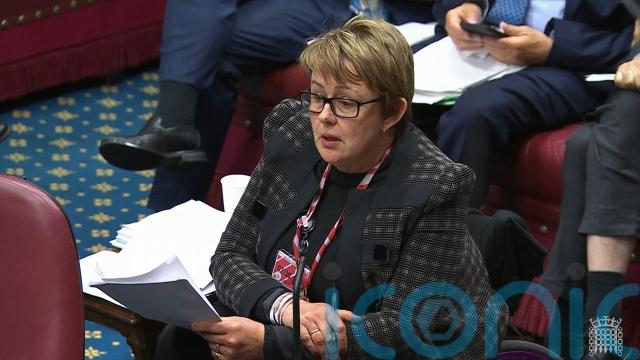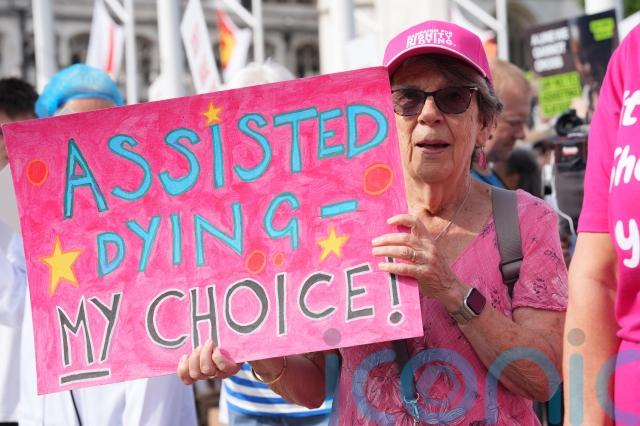
The assisted dying Bill risks running out of time to become law, the Lords has heard amid a record high number of suggested changes to the draft legislation.
Peers debated for almost five hours in their first of at least four days of detailed line-by-line scrutiny of a Bill which could see assisted dying legalised for terminally ill adults in England and Wales.
More than 900 amendments have been put forward – the highest number ever tabled to a piece of backbench legislation.
The Dignity in Dying group, which campaigns for a change in the law, has warned “the risk of deliberate time-wasting is clear and profoundly unfair”.
But a number of peers told Friday’s debate they can only support Bills which are “legislatively fit to be passed”, describing this one as “demonstrably flawed”.
The Terminally Ill Adults (End of Life) Bill will become law only if both the House of Commons and House of Lords agree on the final drafting of the legislation – with approval needed before spring when the current session of Parliament ends.
The Lords is currently looking at potential changes to a Bill some have argued does not have enough safeguards to protect the most vulnerable in society from being pressured into an assisted death.
Baroness Gisela Stuart said there are “so many flaws” with the Bill in its current form “that I don’t think this House, however long we debate it, can actually get it to a stage where it is legislatively fit to be passed, and that is our role”.
She told her colleagues on the Lords’ red benches: “We should not vote for anything that cannot legislatively be properly implemented.”
Lord Andrew Tyrie said while he is a supporter of the Bill’s intentions, it is “demonstrably flawed”.
He suggested the Government must take more control of the draft legislation, which is currently proceeding through Parliament as a private member’s bill (PMB).
With less time allocated compared with Government legislation, a PMB can be more vulnerable in the face of any delays during the parliamentary process.

The Government can make additional time available to enable discussion of a PMB if it wishes.
In response to pleas from some peers for more time to be given to the Lords to scrutinise the Bill, the unelected upper chamber’s chief whip Lord Roy Kennedy indicated further sessions for committee stage could be made available after the four days had been completed but that Government time would not be allocated to the Bill.
Lord Tyrie said: “Surely the Government should now be listening. They should now be grasping that they need to take this Bill in themselves. They need to consult nationally. They need to consult widely. They need to try and find as much consensus as possible, and then in a considered way, they need to come back to the House.
“I think attempting to deal with these 900 amendments in this way is going to end up with the Bill being talked out.”
Conservative shadow attorney general Lord David Wolfson said: “It does seem to me that we are trying to perhaps pour a quart into a pint pot by doing this Bill as a private member’s bill.”
Members had expected to get through 10 groups of amendments – where those with similar effects are batched together – on Friday.
But only two were discussed – on how the Bill would apply in Wales which has a devolved government; and an attempt to replace references to “capacity” with “ability” in the Bill’s wording around eligibility.
Former Paralympian Baroness Tanni Grey-Thompson urged the Government to say what is “going on behind the scenes” to implement assisted dying.
A vocal opponent of the Bill, the crossbench peer said she recently met a member of the public in the City of London, who said he was working “full time” on the rollout, adding: “I’m not sure he meant to tell me that.”
She told peers: “I think we do need to understand how many civil servants are currently working on this. Who’s running the Bill team?”
Ahead of the debate, Sarah Wootton, chief executive of Dignity in Dying, said: “What must not happen now is an effort to talk the Bill out.”
She said with so many amendments being tabled, “the risk of deliberate time-wasting is clear and profoundly unfair”.
Ms Wootton added: “This Bill has twice won the backing of the elected Commons and carries overwhelming public support.
“Peers should honour that, keep dying people at the centre of this debate, and allow the Bill the fair and focused scrutiny it deserves.”

The Bill was narrowly approved by MPs in the House of Commons earlier this year, and received an unopposed second reading in the Lords in September.
This is the furthest any such legislation on assisted dying has progressed through Parliament at Westminster – although the incoming Archbishop of Canterbury Dame Sarah Mullally has previously said she and her Church of England colleagues are likely to bring an amendment to vote on the principle of the Bill, which she will vote against.
If the Bill does pass into law, the Government has four years in which to get an assisted dying service into place, meaning it could be 2029/30 before the first assisted death happens.
The legislation proposes allowing terminally ill adults with fewer than six months to live to apply for an assisted death.
This would be subject to approval by two doctors and a panel featuring a social worker, senior legal figure and psychiatrist.
According to the parliamentary authorities, while some Bills have had more amendments tabled in total at committee stage, this sets a possible record for the number submitted in the first full list of suggested changes and is almost certainly unprecedented for committee stage of a private member’s bill.
Not all tabled amendments will necessarily be debated as members can choose to withdraw theirs during the process.
Subscribe or register today to discover more from DonegalLive.ie
Buy the e-paper of the Donegal Democrat, Donegal People's Press, Donegal Post and Inish Times here for instant access to Donegal's premier news titles.
Keep up with the latest news from Donegal with our daily newsletter featuring the most important stories of the day delivered to your inbox every evening at 5pm.